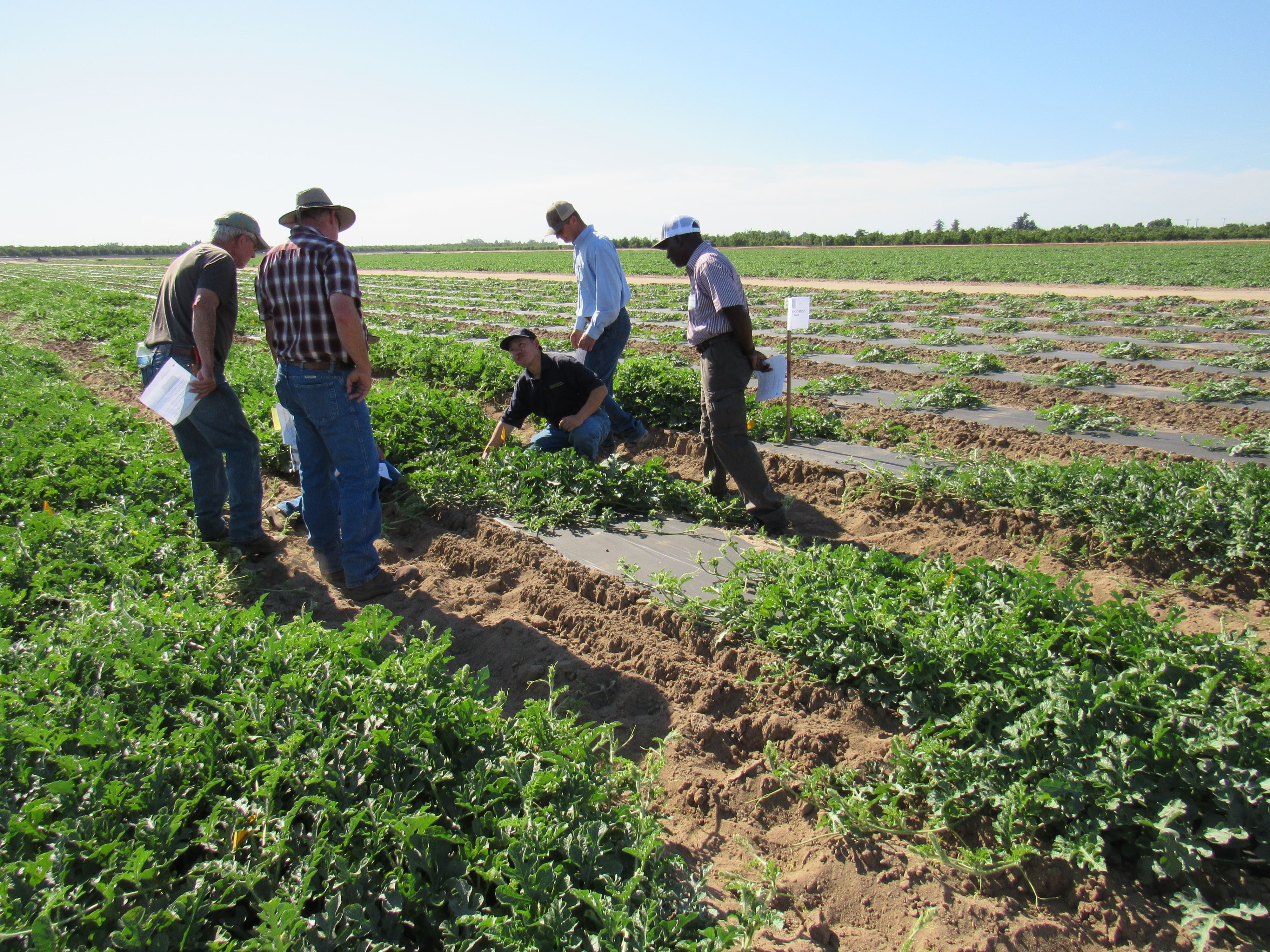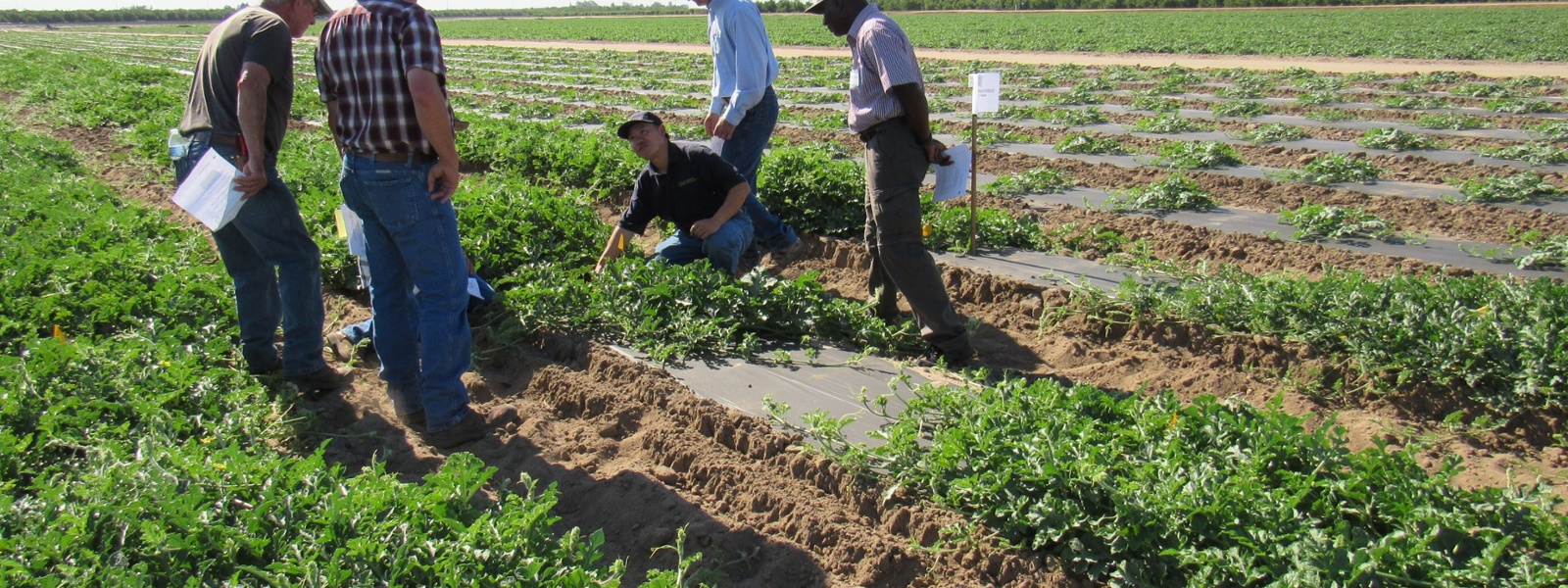Commentary: How farmer-researcher ties help agriculture thrive


.jpg)
University of California Cooperative Extension vegetable and irrigation advisor Zheng Wang, center, works with farmers to share research on grafting watermelons into vigorous rootstocks.
By Donald Bransford
As California’s economy is poised to overtake Germany’s as the fourth largest in the world, I am reminded that research and innovation drive progress.
In California, we are fortunate to enjoy an abundance of healthy food and other agricultural products, even as new complications arise in the business of farming. It’s no coincidence that California is the nation’s top agricultural producer with more than 400 commodities. University of California Agriculture and Natural Resources researchers and the state’s farmers and ranchers have been working together for more than a century to innovate, and our research needs continue to grow to adapt to drought, wildfire, invasive pests and diseases, and other challenges.
Over the years, the rice industry has partnered with UC ANR, including through a funding partnership with the California Rice Research Board. We have dramatically decreased pesticide residue in the waterways, developed new weed management strategies and improved air quality in the basin. We are also working on using flooded rice fields to provide food for migrating salmon. UC researchers are an integral part of the success of the rice industry.
We will need even more research and people to extend those results to the end user. I farm in the Glenn-Colusa Irrigation District, which typically grows about 100,000 acres of the variety of rice used in sushi. This year, with limited water due to the extreme drought, we planted only 1,000 acres of rice.
When large acreages are fallowed, it creates a domino effect: people working for farms and associated businesses lose jobs. It hurts the whole community. Even migratory waterfowl suffer when rice isn’t planted, losing food and habitat when fields along the Pacific Flyway aren’t flooded.
For specialty crops, growers can turn to UC ANR for assistance. For example, when watermelon growers saw an increasing amount of their crop rejected by supermarkets because of the melons’ inconsistent quality, they appealed to UC Cooperative Extension vegetable and irrigation advisor Zheng Wang, who serves Stanislaus, San Joaquin and Merced counties.
By grafting watermelon plants onto more vigorous rootstock, Wang showed growers they could produce 15% to 25% more watermelons of consistent quality using less water.
In Southern California, UCCE irrigation management advisor Ali Montazar is working with avocado growers to test new technology such as soil moisture sensors to fine-tune irrigation applications and reduce water expenses.
To help immigrant farmers, UCCE offers farming advice in Spanish, Hmong, Chinese and other languages. Small farm advisors work with growers to study specialty crops from other countries to find the best way to grow them in California. Where else could they get scientific information tailored to their needs?
Throughout the state, farmers must prepare for wildfire impacts—from evacuating livestock to dealing with smoke in grapes. UCCE specialists and advisors work to develop Ag Pass guidelines appropriate for their regions to allow farmers access to their property to help firefighters and care for livestock. Viticulture specialists are working with grape growers and wine makers to determine how much smoke exposure can be tolerated by grapes.
Although we are constantly facing new challenges, it is an exciting time for me to serve as a member of the UC President’s Advisory Commission on Agriculture and Natural Resources. Thanks to the state’s historic boost to UC ANR funding, more scientists and educators are being hired to address needs of California communities.
On Giving Tuesday, Nov. 29, we have an additional opportunity to support programs that serve our agricultural regions.
In the past, individual donations to UC ANR have been used to host grower meetings to discuss control of a new pest or disease, build UC Master Gardener demonstration gardens, and fund scholarships for children to develop life and work skills in UC ANR’s 4-H programs, among other important uses.
This year, a new UC ANR endowment fund for research has been established commemorating late agriculturalist Jean-Mari Peltier and her leadership and passion for agricultural research, education and teaching. Donations may be made online at donate.ucanr.edu. People seeking more information may contact Mary Ciricillo at 530-219-1085 or mciricillo@ucanr.edu.
Peltier, who served as president of the National Grape & Wine Initiative and the California Citrus Quality Council, played vital roles in supporting a wide range of commodity groups, including those representing grapes, tree fruit, pears, citrus, strawberries and wine.
Now the Jean-Mari Peltier Endowment will advance strategic research and programmatic priorities, including emerging issues facing agriculture, the environment, the food system and our communities. The results will better position farmers to face complex challenges that arise in the future, while furthering the important partnership between UC researchers and California agriculture.
(Donald Bransford is the owner of Bransford Farms, which produces rice and almonds. He may be contacted at donald.bransford@gmail.com.)




